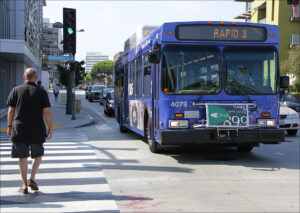
COLORADO AVE — Big Blue Bus leadership turned down advertising from a nonprofit organization that funds AIDS research, citing a long-held policy against non-commercial advertising that has only been rigorously enforced since 2011.
According to an item released to the City Council, the Big Blue Bus had to refuse the 2012 AIDS Walk Los Angeles because it wanted to promote a fundraising event rather than a commercial service or product, despite the fact that the Big Blue Bus has carried the organization's advertisements in the past.
The policy is meant to protect the bus system against becoming a "public forum," which would severely limit City Hall's ability to control the content of the advertising that appears on the buses.
The prohibition is standard for municipal transportation organizations, and the Big Blue Bus is now committed to applying it across the board, unlike years past, said Ed King, the new director of Transit Services.
"We've had different people involved in the administration of the program. They've interpreted it differently," King said. "Now it's consistent."
According to the item, the AIDS Walk team approached the Big Blue Bus administration in July to advertise for its annual 10-kilometer walk that will be held in October.
Event organizers say AIDS Walk Los Angeles has attracted over half-a-million participants and raised $72 million for AIDS research since its inception in 1985.
The city of Glendale, Culver City and the Los Angeles Metro network all have the same policy, King said.
Glendale, for one, gets its bus advertising from outdoor ad companies, and builds the prohibition directly into its contracts with those companies, said Kathryn Engel, the transit manager for the city.
Santa Monica is the only agency Engel knows of in Southern California that does its advertising sales in-house rather than through one of the major companies like Clear Channel or CBS/Decaux.
Keeping ads confined to products and services keeps closed a Pandora's box of problems, she said.
"What that does is restricts the possibility that the sides of the buses would get used as a political forum so that we can be very gracious for anybody who sells a good or service, but wouldn't have to be involved in evaluating the appropriateness of political campaigns or other things that people might want to use the buses for," Engel said.
David Hudson, an attorney with the First Amendment Law Center based on the East Coast, said that might not be enough to keep buses in Santa Monica from becoming an advertising free-for-all.
"The city could try to say that it has a viewpoint neutral reason for rejecting the ad (only accepts purely commercial ads)," Hudson wrote in an e-mail, but pointed to an article he wrote in 2011 regarding a Pennsylvania transit agency that rejected an advertisement that sought to inform former felons of their right to vote.
According to Hudson's article, the Third U.S. Circuit Court of Appeal decided that the Allegheny County Port Authority had discriminated against the Ex-Offender Voting Rights Project, formed by the Pittsburgh League of Young Voters Education Fund and the American Civil Liberties Union, by denying their ad after allowing ads from other nonprofit groups in the past.
"Bottom line, the First Amendment clearly comes into play on municipal bus advertising and the city should not reject ads because of viewpoint," he wrote.
Political speech and other forms of noncommercial advertisement are not the only things prohibited under the policy.
It specifically calls out ads that incite violence or illegal activity; the sale or use of alcohol, tobacco or firearms; is deceptive; or ridicules any specific group of individuals or entity.
ashley@www.smdp.com









